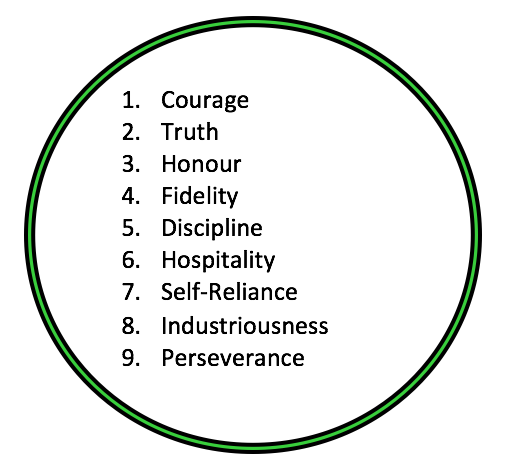“Hygge”, “fika” and the happiest people. The Nordic countries are trending internationally and taking the lead in many different categories. So, what is it that make these Viking heirs succeed in business and – apparently – life itself? And is it more than just a passing trend?

Chris Shern, Managing Director, IME (International Management Education), together with Mr. Henrik Jeberg recently released a new book: “Return of The Vikings – Nordic Leadership in Times of Extreme Change”. On that occasion, Chris Shern visited Singapore to join the discussion on Nordic Leadership in the evening of March 14. But to really understand Nordic Leadership you have to understand its roots. According to Chris Shern it can be traced back to the Viking era.
So, let us start with something very central to the Vikings. The Nine Noble Virtues:

The virtues are derived from ancient Nordic Mythology. It is believed that the Vikings lived their lives according to this set of values. Values of which each can be found in many religions and cultures, but somehow, when you combine them they form a unique basis for leadership – and a way of living. Chris Shern interviewed 50 very different leaders with very different perspectives on Nordic Leadership as part of his research for the book. And what he found for them to have in common were qualities similar to the Nine Noble Virtues. But we will get back to that later.
“The interesting twist to Nordic Leadership is looking at the Vikings and thinking is there something deeper? The traditional association when you think of the Vikings is that they were brutal ruthless warriors and rapists, and they were that, but that was more characteristic of the time. But it was also a relatively small area that dominated a great part of Europe the north African coast, in to the middle east, deep into Russia and all the way to North America, which they discovered long before Christopher Columbus. And this is what we see in the Nordic countries today – relatively small countries that are punching above their weight and leading the way in many categories,” Chris Shern explains.

An outsider-on-the-inside
Chris Shern is no Nordic himself. He was born and raised in the farming country of Wisconsin, USA. But as a student he went to Denmark on a brief and returned 15 years after. And today, more than 30 years after, he has become a culturally integrated citizen of the North. Or as Chris Shern would put it: An outsider-on-the-inside. For more than 20 years Chris Shern worked in a truly Nordic company – Scandinavian Airlines, and he also worked internationally and promoted the entire Nordic region. His last position in SAS was the General Manager for Italy and the Eastern Mediterrenean. He has worked under Swedish, Danish and Norwegian bosses and has himself supervised Swedish, Danish and Norwegian employees. This outsider-on-the-inside perspective has given Chris Shern a unique opportunity to reflect upon the qualities of Nordic Leadership. And to strengthen the book’s shades and perceptions on the topic, his co-author, Henrik Jeberg, works in the opposite position in America as an insider-on-the-outside.
“When I left SAS in 2014, I started to reflect back on my career path and if there was some way I could utilise that uniqueness. I started to realize that I have a very unique insight into Nordic Leadership,” Chris Shern explains.
And Nordic Leadership is indeed a hot topic these days. The Nordic countries rank first year after year when it comes to being the happiest people on Earth. Dozens of books are being written about Swedish “fika” or Danish “hygge”. For Chris Shern the question was really: Is this just a trend or is there something more going on? Maybe the Nordic approach bears more relevance to the times we live in – the Times of Extreme Change. And so, to understand why Nordic Leadership is more relevant nowadays, you will need to understand what is meant by Extreme Change.
“Some people maybe call it a VUCA world – volatile, uncertain, complex and ambiguous. You also hear about a Post-Industrial era. We are entering a different time, a digitalized, globalized and connected world and all the opportunities and challenges that that can create. There is not a single industry or business model that is neither being disrupted or has a threat of being disrupted. And one thing is certain: Things will never be going as slow as they are right now – we will be entering a time where the rate and speed of change will only be increasing in the amount of complexity,” Chris Shern explains.
To Chris Shern the thinking was, that the Nordic approach to leadership is better equipped than others to meet the challenges of a chaotic future. Gone are the days when a boss could sit back and hold on to all the knowledge and information and you repeatedly had to go and ask him whether you can or cannot do something. What Chris Shern saw among the Nordic leaders was courage to delegate great responsibility to their employees, and for the employees to have the discipline and self-reliance that is needed to handle great tasks. This kind of corporation is depending on fidelity and for everyone to take an honour in their work. Chris Shern also found that all the people he interviewed were driven by something more than just making money. It was about having a purpose and giving back.
And now back to the Nine Noble Virtues.
“The Nine Noble Virtues was not about right or wrong or punishment from God, it was more about trying to be the best person you can be. The Vikings were very innovative and very good at incorporating other cultures, even the countries that they conquered. They were good at incorporating that to their own culture and also bringing it back home. And women played a very important role in Viking culture, also on the battle field. The virtues are not uniquely Nordic in any way, but maybe the combination of them is,” Chris Shern explains.
In Nordic Leadership today, you can find the same flair for incorporating other cultures and adapting the Nordic culture to the environment in which the business exists. This allows the companies to get their business on the international market successfully. You could call it hospitality.

Trust is essential
Being an American, Chris Shern is very familiar with the opposite kind of leadership. Rigid management control systems and strict hierarchical leadership. A highly efficient way of working in industrial times. But that kind of approach requires simpler societies and is no longer compatible with the world of today. People in business today – from top to bottom – need to have an entrepreneurial mind-set and to have some level of industriousness and perseverance, and a key word here is trust. Trust is essential for the low power distances that characterizes Nordic Leadership. And this is where we see the virtue truth. Trust is completely depending on people to be honest about their abilities and challenges.
“One of the most important aspects is a high level of trust. A high level of trusting society, a high level of trust within leadership. And that is why you have low corruption and you pay your taxes relatively willingly,” Chris Shern explains.
While being the strength of Nordic Leadership, this may also be Nordic Leadership’s weak spot. When you trust, you become vulnerable. Chris Shern tells, that many of the people he interviewed had been taking advantage of, exactly because of their high level of trust. Still the basic approach of trusting people, delegating and allowing others to be creative within structure has proven so extremely effective, that it is worth taking the risk. And in times of Extreme Change, it might be absolutely essential.
“What we want to do with this book is to inspire. It is all about personal and business development. And we are going to be faced with the necessity to continue to learn, unlearn and relearn. This kind of continuous development is going to be more necessary now than ever before. It is not a trend,” Chris Shern states.


